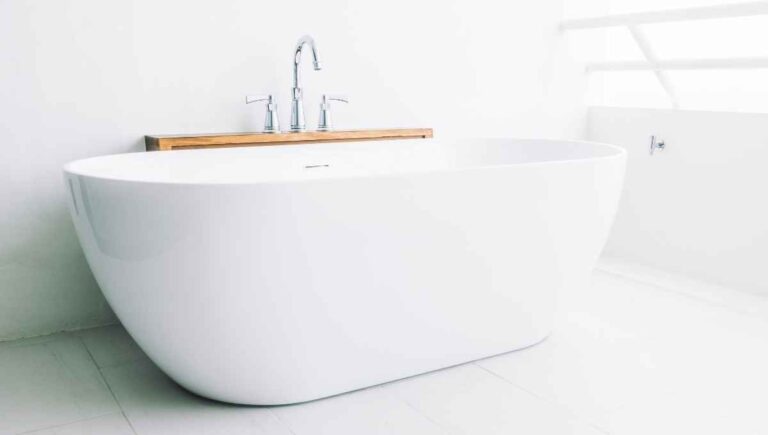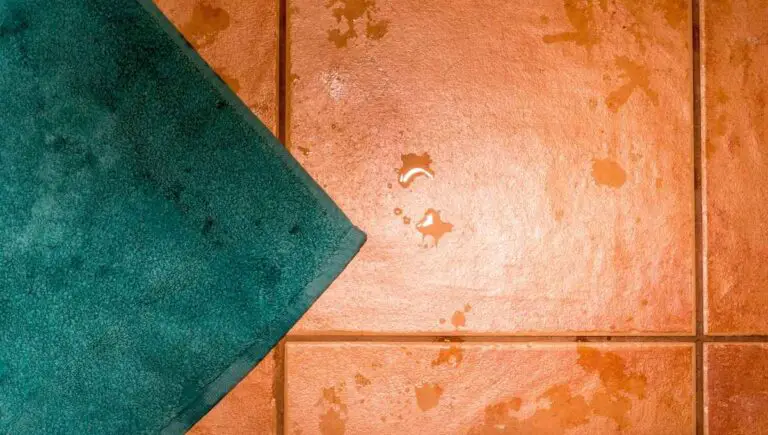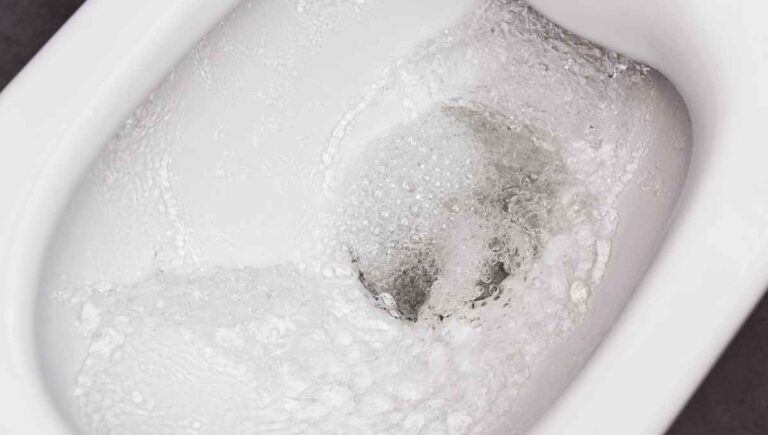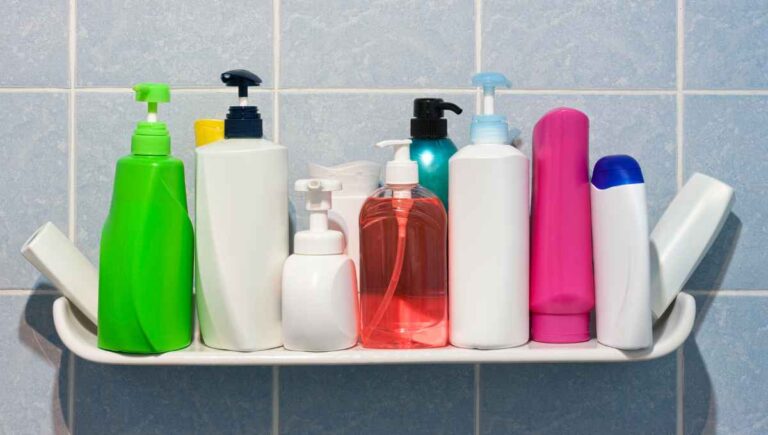Are Shower Curtains Waterproof? (Use This Kind Instead)
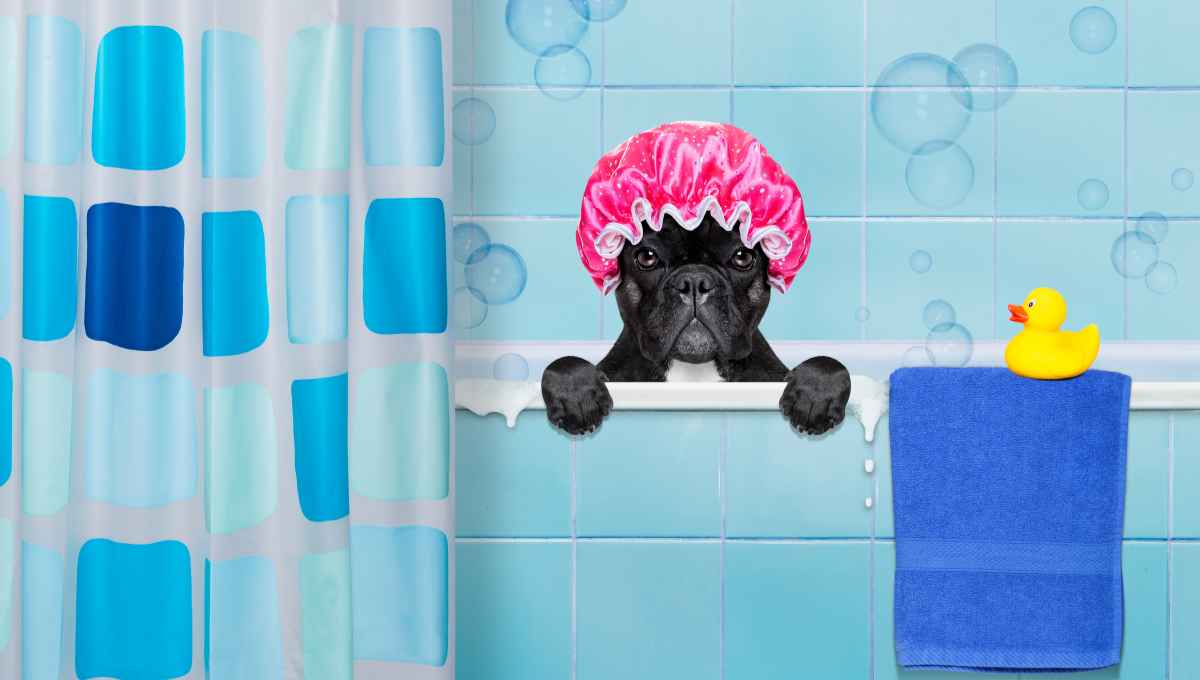
Some people love their shower curtains and choose them purely for aesthetics. Then there are the people that choose a functional shower curtain liner for their shower because it’s useful. If you’re the former, you may wonder, are shower curtains waterproof?
Some shower curtains are indeed waterproof, while others are simply water-resistant. It depends on the materials used to make the shower curtain and the type of finish applied. For example, vinyl shower curtains are often waterproof, while cloth shower curtains may only be water-resistant.
If you’re curious about whether or not your curtain needs a liner or if your shower curtain is waterproof, you’re in the right place. In this article, we’ll be discussing all things waterproof shower curtains!
This post contains affiliate links. This means Household Blogger may earn a commission should you make a purchase using any of our links. Please refer to our full affiliate disclosure policy for full details.
Here’s a Quick Pro Tip!
These days, nothing stops you from buying a shower curtain made from fabric or PEVA that can resist water. It saves you from needing a liner, and most are easy to clean.
Here are three of our favorite shower curtain options for the next time your bathroom needs a refresh:
1. Octopus – For the underwater sea-creature lover of the home!
2. Snorkle Cat – Who doesn’t need a cat snorkeling?
3. Unicorn Riding a T-Rex – Enough said. Our personal favorite.
Shower Curtains and Waterproofing
It’s only logical that fabric shower curtains aren’t waterproof, right? Or are they? If they aren’t, can we make them waterproof? It is possible to waterproof fabric, and we’re going to talk about it now!
What Kind of Shower Curtain Is Waterproof?
Any shower curtain that has been made with plastic or that has been coated with a waterproof sealant can be considered waterproof. Most shower curtains will say right on the package that they are waterproof or have been given a waterproof coating.
These days, even most fabric shower curtains have a waterproof coating on them. This coating prevents water from soaking into the fabric. Instead, water beads then roll right off the curtain and back into the tub.
Are All Shower Curtains Waterproof?
Not all shower curtains are waterproof, though the vast majority are. However, it is always best to check the label and packaging to be sure it says waterproof or water-resistant before purchasing.
Certain shower curtains will always be waterproof, for example, those made of vinyl. However, if your shower curtain isn’t waterproof, you will want to use a liner on the inside to protect your curtain from excess water, which can lead to mold if not dried correctly.
How Do I Waterproof My Shower Liner?
There are a couple of easy ways to waterproof a shower liner, though most liners are already waterproof. If you want to waterproof a fabric shower liner, you first need to ensure that the fabric is tightly woven, as most waterproofing methods won’t work on open weaves.
Once you’ve gotten the correct fabric, you can spray a liquid sealant onto the curtain and let it dry completely. If you don’t want to use something with a chemical base, you can also use beeswax to seal it, though it will be stiffer.
Is There a Waterproof Shower Curtain With No Liner Needed?
These days, there are plenty of waterproof shower curtain options that do not require a separate liner. Depending on the brand, these curtains will be marked either waterproof or water-resistant.
Shower curtains no longer need an unsightly liner behind them to protect them from water. Even better, plenty of these curtains come with aesthetically pleasing designs. So forget just having a basic white curtain!
What Happens if You Don’t Waterproof a Shower Curtain?
If you don’t waterproof your fabric shower curtain, it will become saturated with water during your showers. Then, if they aren’t dried out correctly, mold and mildew may fester and grow quite quickly.
While most molds and mildews are pretty harmless, though gross, there are certain types of black mold that can make you and your family very ill. Additionally, wet shower curtains may lead to water being released onto the floor, which can be a serious hazard for those who cannot walk well.
Liner Time
Whether or not to have a liner in your shower is something people think a lot about. Some decide just to use a liner, and no curtain, while others do the opposite. So, we decided to see which was best!
Do You Need a Liner With a Shower Curtain?
As long as your shower curtain is waterproof, a liner is technically superfluous. That said, plenty of people still prefer the extra layer and the added security of knowing that water will not leak from the shower while bathing.
A liner is helpful for those who are concerned water is going to splash out of their tub or shower while they’re showering. In addition, liners often have weights on them, so they are less likely to billow or move while showering.
Does a Polyester Shower Curtain Need a Liner?
Polyester shower curtains are typically waterproof. Therefore, there is no need for a shower liner when using them. However, you should always check the label on your curtain before purchasing to ensure it is waterproof.
Because some shower curtains are not inherently waterproof, it is important to check their status before attempting to shower using one. Without a waterproof layer, water may leak from the shower and cause hazardous conditions in your bathroom.
Is a Polyester Shower Curtain Waterproof?
Polyester is water-resistant, and a polyester shower curtain will be waterproof. This means you don’t have to use a liner along with the curtain, though you are welcome to do so if you wish.
While polyester isn’t inherently waterproof, nearly everything made from polyester is treated as a waterproof fabric. This is because it’s been sprayed with a waterproofing material to make sure it won’t get wet when exposed to water.
How Do I Waterproof My Shower Curtain Liner?
Your shower curtain liner should already be waterproof. Most liners are made from either plastic or a waterproofed fabric. If your curtain liner is taking on water, your best option is to replace it.
Fabric liners may lose their water resistance over time. You can attempt to extend their lifespan by spraying them with a waterproofing spray, but at a certain point, it’s best to replace them before they begin growing mildew and mold.
What Is a PEVA Liner?
A PEVA liner, otherwise known as a polyethylene vinyl acetate liner, is a type of shower curtain liner known for being less toxic than its PVC liner counterparts. As a result, it’s better for the environment and doesn’t cost more!
More and more, people are choosing PEVA liners over plastic or PVC liners due to their eco-friendliness. After all, don’t we all want to save sea turtles? Or, to be the most eco-conscious, skip the liner altogether and just use a sea turtle curtain!
What Is the Best Material for a Shower Curtain Liner?
PEVA or fabric material is best for a liner. PEVA is engineered to be less harmful to the planet. Fabric curtains can be waterproof, plus they’re machine washable. Or, skip the liner completely if your shower curtain is waterproof!
PEVA liners are always waterproof and can be made clear so as not to detract from your decorative shower curtain. Or, get an opaque curtain liner that can be used in place of a shower curtain.
You might also enjoy our post on Can I Use a Shower Curtain Without a Liner?
Curtain Types
As we’ve already seen, shower curtains and liners come in all different types, though the main two are plastic and fabric. But there is a lot more nuanced than that. So, now we’re discussing the different types of shower curtains and which are the best.
What Material Are Shower Curtains Made From?
Shower curtains can be made from a variety of materials, but the most common include cotton, polyester, vinyl, PEVA, and microfiber. All of these materials are water-proof or water-resistant.
A lesser-known but still effective material for shower curtains is hemp and bamboo. These curtains are naturally mold and mildew-resistant and are better for the environment than plastic. Plus, they’re machine washable!
Are Cloth Shower Curtains Better Than Plastic?
Cloth shower curtains are better for the environment than plastic. However, they do require a washing machine for cleaning versus being able to spray them down with cleaner.
In addition, cloth shower curtains are quieter than plastic and are less likely to billow in and stick to you while you shower. Plus, there are typically no chemicals in cloth curtains, which cannot be said for plastic ones.
Can I Use Regular Curtains as Shower Curtains?
It’s pretty easy to DIY a shower curtain, especially if you’re starting from a regular window curtain. A single panel from a window curtain should be enough to cover a stall-style walk-in shower.
The most important thing will be to waterproof your new shower curtain. You can do this by spraying it with a waterproofing solution. Ensure the solution has time to dry completely before using the new shower curtain.
Can Fabric Shower Curtains Get Wet?
Most fabric shower curtains are treated to be waterproof, so it’s completely fine for them to get wet. Instead, the water should bead and run off the curtain and into the tub, leaving the curtain dry.
If, however, your fabric curtain is getting wet, you may want to add a liner to prevent this. Otherwise, be sure to wash your fabric curtain often to prevent mold and mildew from growing on the curtain.
What Can I Use Instead of a Shower Curtain?
Instead of a shower curtain, you can use just a shower liner. They typically come in clear or opaque, but you can also find some that have decorative designs on them if you want an aesthetically pleasing one.
You can also do an alternative-style shower if you’re redoing your bathroom and have the funds. Then, you can make a sliding door or even have an open space for your shower, with no curtain necessary. It’s all up to you!
Can You Use a Shower Curtain for a Walk-in Shower?
Shower curtains can absolutely be used for a walk-in shower, though you may need to add weight or magnets to the bottom of the curtain to ensure it does not billow in while you’re showering.
Adding magnets to the bottom of your curtain can work if you just need to secure the curtain to the walls on either side. If, however, there is nothing magnetic for them to stick to, adding removable weights may be the preferable option.
Related Questions
What Is the Best Waterproofing Membrane?
Most professionals consider polyurethane to be the best material to waterproof a surface. A polyurethane membrane can slip into the tiniest of cracks and crevices to ensure your bathroom is waterproof wherever needed.
However, if polyurethane isn’t your style, there are other options, including:
- Rubber sealing
- Bituminous membrane
- Rubberized asphalt
- Thermoplastic
- PVC waterproofing membrane
- Cementitious coatings
How Do I Know if My Bathroom Has Been Waterproofed?
If your bathroom has been professionally done, it should have been thoroughly waterproof as well. Waterproofing is when a sealant is placed between the tiles of your shower and in any other crevice that may hold water if not properly taken care of.
If you notice that the seals around your tiles are starting to come up or your tub is feeling spongy, it’s time to re-seal. You should contact a professional to ensure that your bathroom is completely watertight.
Is Polyester Waterproof or Water-Resistant?
Polyester is water-resistant. This means that water is likely to bead and fall from the material instead of soaking into it. However, it can become saturated if exposed to enough water all at once.
The amount of water polyester can resist grows higher as the fabric’s thread count does. Meaning the higher the thread count of the polyester fabric, the more water-resistant it becomes.
Final Thoughts
People can be strangely passionate about their shower curtains, but I guess you can’t blame them. After all, you can get anything on a shower curtain these days, from an octopus to a unicorn riding a t-rex, so you want to show it off.








